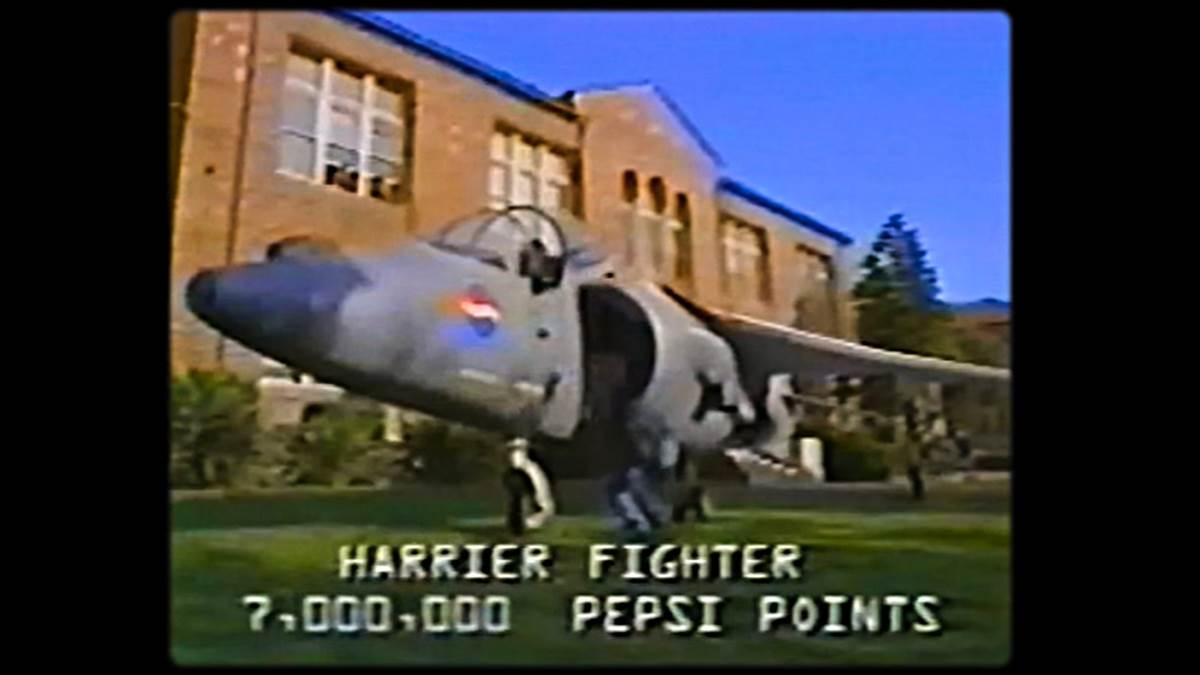Drink Pepsi, get a jet
The Pepsi Generation takes off, or tries to...

Among their various promotions was “Pepsi Stuff,” a program with which Pepsi lovers could collect points redeemable for Pepsi-branded merchandise, such as T-shirts, jackets, bags, and mountain bikes. That year, as millions of Americans were watching the Super Bowl, Pepsi aired a commercial that seemed to offer a Harrier jet as a prize to anyone who collected 7 million Pepsi points.
Seven million points? Ridiculous, right? An obvious joke, right? One young man didn’t think so. John Leonard, a 20-year-old student from Seattle, thought getting the jet—although he was not a pilot—would be a fine idea. He determined it would cost $11 million to buy enough Pepsi to accrue 7 million points, which he still thought was a good deal for a jet valued at $23 million in 1996 ($37 million today). His calculations quickly revealed that more costs would accrue. If Leonard bought $11 million of Pepsi, he’d need to have it delivered somewhere with room to store it, and then hire staff to remove, count, and collate the required points, which were removable labels affixed to the bottles or cases.
The jet depicted in the commercial was a McDonnell Douglas AV-8B Harrier II, a single-engine, attack aircraft capable of vertical or short takeoffs and landings. In the TV commercial, a teenager lands his Pepsi-points jet in the school yard.
One day, when Leonard thought his plan really was untenable, he read the fine print of the program and learned that participants could buy points for 10 cents each. So, 7 million points would cost him “only” $700,000. Leonard thought that really was quite a deal for a $23 million jet and convinced his rich friend, Todd Hoffman, to invest in the scheme. So, as per the rules, they sent in 15 points, $699,998.50, plus $10 for shipping and handling.
Obviously, a $700,008.50 check in the mail raised the eyebrows of someone at Pepsi. After much discussion, the corporate types decided to ignore Leonard’s check, which they returned to him with coupons redeemable for a couple cases of Pepsi. At this point, Leonard and his investor could have laughed it off as a good try, but you know how Americans love to sue each other.
The first call by the suits at Pepsi was to the advertising agency that produced the commercial. Why wasn’t there a disclaimer, like “just kidding,” at the bottom of the TV screen? A fight between the corporate giant and the “little guy” ensued, which, this being America, ended in court. Was the TV commercial a legitimate offer by Pepsi? Was it obviously a joke or false advertising? Could a civilian even own a modern military jet?
Pepsi certainly never thought it might have to provide a jet to anyone, and its next call was to the Pentagon. Could Pepsi buy a Harrier? Evidently, if nations wanted to buy a Harrier, they had to buy a minimum number, with permission from the U.S. government. The Pentagon stated that the jet would not be sold to civilians without “demilitarization,” which they decided meant stripping it of its VSTOL capabilities. So, no landings in the school yard.
Leonard, Hoffman, and their lawyers met with Pepsi’s legal team several times to work out a compromise, and at one time Pepsi offered a fair pile of money. Leonard thought it over but decided to go for broke and turned down the cash. Pepsi continued to air the commercial, but increased the number of points to 700 million and added the “just kidding” disclaimer. This became one of the many points argued in the legal case. Leonard’s lawyers asked, “if the commercial was so obviously a joke, why did Pepsi change it and add the disclaimer?”
The case, Leonard v. PepsiCo Inc., was tried in New York in 1999. The outcome? Let’s just say, sometimes when you go for broke, you go broke. The judge ruled for Pepsi, stating that the commercial had not been a legal offer and no reasonable person could have believed that the company seriously intended to convey military jets, especially not for pennies on the dollar. No other person in the world attempted to collect and redeem points for the Harrier.
In November 2022, Netflix released a documentary series about the case, Pepsi, Where’s My Jet? It’s a four-episode series.


